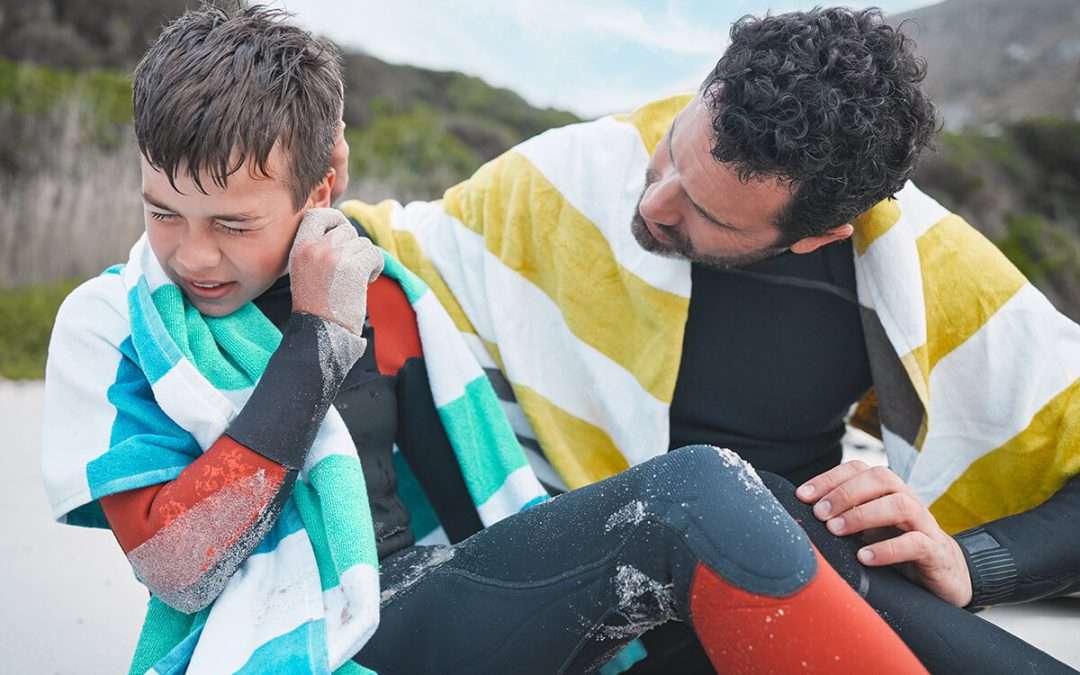Adding to the list of medical conditions named after sports – athlete’s foot (tinea pedis), surfer’s eye (pterygium), and tennis elbow (lateral epicondylitis) – swimmer’s ear is in good company. Also known as otitis externa, swimmer’s ear affects landlubbers too, not just those with a love of the water.
What is Swimmer’s Ear?
Swimmer’s ear is an infection of the ear canal, which is the passage from the outside of the ear to the eardrum. It is slightly different from otitis media, which is an infection of the middle ear, behind the eardrum. However, the two conditions share the same feature of being more common in children (as well as sharing the same feature of both affecting the ear).
The infection involved in swimmer’s ear is typically caused by bacteria that have taken advantage of a warm, wet ear canal to flourish and multiply. Less commonly, otitis externa can also be caused by viral or fungal pathogens.
The symptoms of swimmer’s ear can include:
- Itching inside the ear
- Pain, particularly when pulling at the outer ear
- Fluid or pus discharge from the ear canal
- Redness and swelling around the area
- Difficulty hearing
- A foul smell from the ear
Causes of Swimmer’s Ear
Otitis externa is linked to swimmers because a dip in the water creates the perfect ear canal environment for those pesky bacteria. In addition to the pool, other situations can also cause moisture to get trapped in the ear canal, such as:
- Humid environments
- Sweating
- Soaking in a jacuzzi or hot tub
- Showering or bathing
Sticking foreign objects into your ear canal can also be a precipitating factor for an episode of otitis externa. Hairpins, cotton swabs, pen caps, fingernails, paperclips, keys (or anything else long, thin, and pointy) are best restricted to their intended purposes, which don’t include cleaning earwax from your ears. Not only can these items scratch the delicate skin, but earwax is actually protective against infections in the ear.
The anatomy of the ear canal can contribute to outer ear infections. Narrower canals tend to drain more poorly, creating that moist environment for bacteria to take hold. Children have ear canals that are narrower and less slanted, meaning they are unable to naturally drain away fluid as easily. This makes them more prone to ear infections.
Treatment and Prevention
As prevention is always better than cure, if you or your children are prone to swimmer’s ear, consider taking some steps to avoid getting it in the first place.
- After getting the ears wet, whether in the bath, pool, or beach, dry them thoroughly
- To get as much moisture out as possible; tilt your head to each side, and gently pull on your earlobes to straighten out the canal and let even more fluid drain
- You can consider using a hairdryer on the gentlest setting to dry out the ear canals even further, but be careful of hearing damage from holding the hairdryer too close to your ear
- When swimming, use a properly fitted swim cap over your ears or earplugs
Some people may want to use ear-drying drops after getting their ears wet. However, these drops are not suitable for everyone, such as those with a ruptured ear drum, existing swimmer’s ear, or ear tubes. Check with your doctor first if they recommend using these drops.
If you do develop swimmer’s ear, treatment is generally straightforward. Your family doctor will clean out any debris from the canal and assess your eardrum. If your eardrum is confirmed to be intact, you will most likely be prescribed ear drops. Antibiotic drops combat bacteria, while anti-fungal drops are available if the infection is caused by a fungus. You may also be prescribed a steroid ear drop to manage inflammation, or a medication that deters bacteria from growing in the future.
If your eardrum has been compromised, you may need an alternative treatment to ear drops. In this case, your doctor may refer you on to an ENT (ear, nose, throat) specialist.
In addition to using the medicated ear drops as prescribed, recovering from swimmer’s ear can be supported by:
- Keeping your ears dry, including in the shower
- Avoid using earbuds or hearing aids
- Using painkillers as necessary
You should expect your symptoms to resolve within a couple of days.
Severe cases of otitis externa might need more intensive therapy, such as oral or intravenous antibiotics. This is especially important if the infection has spread from the ear to nearby tissues, including the bone or cartilage. Although this is uncommon overall, it is more likely in the elderly or immunocompromised individuals, such as those with HIV.
Complications from swimmer’s ear are not common, but this condition shouldn’t be ignored. If you notice any unusual pain or discharge draining from your ear canal, get it checked out with your family doctor.

